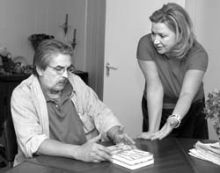Roman Solchanyk is an American historian, analyst, and researcher from Santa Monica, California, whose parents hail from Halychyna. During his recent visit to Kyiv he visited The Day ’s editorial office, because even though he lives far away, he maintains close ties with our newspaper. Solchanyk began reading The Day as soon as it was founded. Then, much to his delight, the Internet appeared, and The Day set up its own Web site www.day.kiev.ua. When Solchanyk was finishing his graduate studies at the University of Michigan, he met James Mace whom our newspaper reveres as a true Ukrainian in spirit, even though not a single drop of Ukrainian blood flowed through his veins. Professor Mace called for the Holodomor of 1932-1933 to be recognized as an act of genocide against the Ukrainian people. Both Mace and Solchanyk were students of the renowned American historian Roman Szporluk, who now teaches at Harvard University. Solchanyk was a longtime analyst at Radio Liberty in Munich. “He is one of those who advocated the fall of the Soviet system,” says his colleague Yuriy Shapoval, “but he never did this from the position of linear nationalism. He did it from a civilized position by comparing the systems of values.” The purpose of Dr. Solchanyk’s latest visit to Ukraine was to gather materials for a new book.
“I generally live independently, and I’m not a member of any Diaspora organization,” Solchanyk says. The only immigrant organization of which he is a member is the New Jersey-based soccer club Chornomorska Sich. The Day asked Dr. Solchanyk to comment on his impressions of Kyiv and his research, and give his assessment of the current situation in Ukraine.
“From the very outset, I had a skeptical view of the ‘Orange events’ and what is now going on in Ukraine. I saw absolutely unwarranted euphoria during the 2004 elections, especially in the Ukrainian Diaspora in the US. This was especially evident when I would read American newspapers and see phrases, like ‘Everything’s OK, ‘democracy flourishes,’ or ‘a new Ukrainian nation has been born.’ First of all, I think that nations are built, not born.”
“You are assessing the latest events as an experienced analyst. So, you are aware of the problems that preceded them and the consequences that will follow. Do you have any ‘prescriptions’?”
“It was clear to me from the very beginning that the team that called itself ‘united’ was not. They simply knew how to cooperate well. Then scandals began to crop up.”
“Many television viewers and newspaper readers are becoming more and more confused about what is going on in this country. Do you know what’s going on?”
“I don’t know, but I share your viewpoint. People seem to be disoriented and disillusioned after the euphoria that they felt during the Orange Revolution. I think people are afraid because they don’t know what’s going to happen next. The famous memorandum that the president signed with the Party of Regions also scares and warns people.”
“What is your book about?”
“Ukraine, Moldova, and Belarus have had certain historical ties with the West. The book analyzes what happened in these countries after they gained independence and what processes are going on in the countries that have still not decided in which direction to go. The processes underway in Ukraine show that it will finally choose the pro-Western direction no matter who is leading the state. But the EU has a biased attitude toward Ukraine. A colleague of mine once said that Ukraine is too poor, too big, and too Soviet to be admitted to the EU. So you should first become Ukrainian and only then European. In my book I am trying to gauge the three countries’ chances to enter Europe.”
“In international scholarly circles there is a large group of Sovietologists and experts on Russia. Is there a well-established school that studies Ukraine?”
“Of course. There is an entirely new generation of people who have no genetic or ethnic ties to Ukraine. James Mace was one of the first. As of today, there are 10 to 20 people who are doing research on Ukraine. This is a very large number for America. There are many young people among them. I remember that when I was young, it was not fashionable to write theses on Ukrainian problems. If you wanted to make a career for yourself, this subject was totally undesirable. Now, as the figures I cite show, the situation is different. That in itself is significant.”







